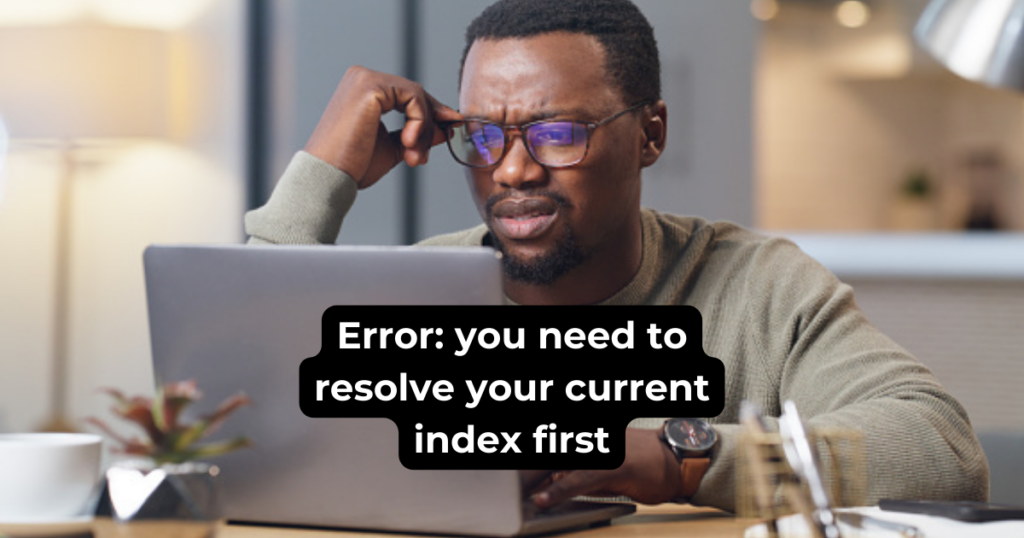In the world of search engine optimization (SEO), website indexing plays a crucial role in determining the visibility and ranking of a website. However, encountering the Error: you need to resolve your current index first can be a cause for concern. This error indicates that there are underlying issues with your website’s current index that need to be addressed promptly in order to ensure optimal performance.
Understanding the Error Message
When you come across the Error: you need to resolve your current index first, it signifies that there are problems hindering the indexing process of your website by search engines. This can have a significant impact on your website’s visibility in search engine results and, subsequently, its organic traffic and conversions. It is crucial to understand the root causes of this error to effectively resolve it and enhance your website’s SEO performance.
Also Check: Twice Heardle
Causes of the Error

Incorrect configuration of website settings:
Incomplete or outdated sitemap: A sitemap serves as a roadmap for search engine bots to navigate your website. If your sitemap is incomplete or outdated, search engine bots may encounter difficulties in properly indexing your website’s content. Ensure that your sitemap is up to date and includes all relevant pages.
Robots.txt file restrictions: The robots.txt file instructs search engine bots on which parts of your website to crawl and index. If your robots.txt file contains restrictive directives, it may prevent search engine bots from accessing and indexing important pages. Review your robots.txt file and ensure that it allows necessary access.
Blocked access to search engine bots: Sometimes, websites unintentionally block search engine bots from accessing their content, resulting in indexing issues. Check your website’s settings and make sure search engine bots have unrestricted access to your web pages.
Technical issues with the website:
Server or hosting problems: If your website experiences frequent server downtime or hosting issues, search engine bots may struggle to crawl and index your web pages effectively. Consider switching to a reliable hosting provider and monitor your website’s uptime to resolve these technical issues.
Slow website loading speed: A slow-loading website can negatively impact user experience and search engine indexing. Optimize your website’s loading speed by compressing images, minifying code, and leveraging caching techniques to facilitate smooth indexing and improve user engagement.
Broken or inaccessible pages: Broken links and inaccessible pages can hinder search engine bots from properly indexing your website’s content. Regularly check for broken links, fix them promptly, and ensure that all pages are accessible to both users and search engine bots.
Issues with website content:
Duplicate content: Having duplicate content across your website can confuse search engines and dilute the ranking potential of your web pages. Identify and address instances of duplicate content by utilizing canonical tags, 301 redirects, or by rewriting the content to make it unique.
Poorly structured URLs: URLs that are complex or lack proper structure can make it difficult for search engine bots to understand the hierarchy and organization of your website’s content. Optimize your URLs by incorporating relevant keywords and ensuring a logical structure.
Thin or low-quality content: Content that lacks depth or fails to provide value to users can impact your website’s indexation and rankings. Focus on creating comprehensive, informative, and engaging content that aligns with user intent and incorporates relevant keywords strategically.
By addressing these underlying causes, you can effectively resolve the Error: you need to resolve your current index first and improve your website’s overall SEO performance. Stay tuned for the next section, where we will explore the consequences of ignoring this error and the importance of resolving it promptly.
Consequences of Ignoring the Error
Ignoring the Error: you need to resolve your current index first can have severe repercussions on your website’s search engine visibility and overall online success. By neglecting to address this error promptly, you risk the following consequences:
Decreased Search Engine Visibility: When search engine bots encounter difficulties in indexing your website, your web pages may not appear in search engine results or may be pushed down in rankings. This leads to a significant decrease in organic visibility, making it challenging for potential visitors to find your website.
Reduced Organic Traffic: With lower search engine visibility, the organic traffic to your website is likely to decline. Organic traffic is crucial as it brings in highly targeted and relevant visitors who are actively searching for the products, services, or information you offer. Ignoring the error can result in a substantial loss of organic traffic and potential customers.
Negative Impact on Conversions: When your website’s visibility diminishes, it directly affects the number of conversions you can achieve. Whether your goal is to generate leads, drive sales, or increase subscribers, a decrease in organic traffic will hinder your ability to achieve these objectives. Resolving the error is vital for restoring optimal conversion rates.
Potential Penalties from Search Engines: Search engines prioritize websites that adhere to their guidelines and provide a positive user experience. Ignoring the error and failing to address the underlying issues may result in penalties from search engines, such as a drop in rankings or even being deindexed entirely. These penalties can be difficult to recover from and may harm your website’s long-term online presence.
To safeguard your website’s performance and mitigate these consequences, it is imperative to take prompt action and resolve the Error: you need to resolve your current index first
Resolving the Error

To resolve the Error: you need to resolve your current index first, and enhance your website’s indexing, it is essential to address the underlying causes we discussed earlier. Let’s explore the key steps involved in resolving this error:
Reviewing and Updating Website Settings:
Auditing the sitemap: Conduct a thorough review of your website’s sitemap and ensure that it is complete, up to date, and accurately represents the structure of your website. Make sure all relevant pages are included and prioritize high-value content.
Checking the robots.txt file: Review your robots.txt file to identify any restrictive directives that may be blocking search engine bots from accessing and indexing important pages. Adjust the file to allow necessary access to relevant content.
Verifying search engine bot access: Double-check that your website settings and configurations do not inadvertently block search engine bots. Ensure that search engine crawlers have unhindered access to all parts of your website.
Addressing Technical Issues:
Resolving server or hosting problems: If you have been experiencing server downtime or hosting-related issues, it is crucial to address them promptly. Consider switching to a reliable hosting provider that offers good uptime and responsive customer support.
Optimizing website loading speed: Website speed is a crucial factor for both user experience and search engine indexing. Implement optimizations such as image compression, minification of code, browser caching, and content delivery network (CDN) integration to enhance your website’s loading speed.
Fixing broken or inaccessible pages: Perform regular audits to identify broken links, 404 errors, or pages that are not accessible to users and search engine bots. Repair or redirect these pages to ensure a smooth indexing process.
Improving Website Content:
To enhance your website’s indexing and address content-related issues, consider the following steps:
Identifying and addressing duplicate content: Conduct a thorough content audit to identify instances of duplicate content within your website. Use tools like Copyscape or Siteliner to identify duplicate content both within your site and across the web. Once identified, take measures to eliminate or consolidate duplicate content by utilizing canonical tags, 301 redirects, or rewriting the content to make it unique.
Optimizing URL structure: Review the structure of your website’s URLs to ensure they are optimized for search engines and user readability. Incorporate relevant keywords in the URLs and keep them concise, descriptive, and easy to understand. Avoid using complex parameters or unnecessary numbers in your URLs, as they can confuse search engines and users.
Enhancing content quality and depth: Focus on creating high-quality, comprehensive content that provides value to your target audience. Conduct keyword research to identify relevant and valuable topics, and then create in-depth articles, guides, or blog posts that cover those subjects thoroughly. Incorporate relevant keywords naturally throughout your content, ensuring it flows smoothly and provides a seamless user experience.
By implementing these strategies, you can effectively resolve the Error: you need to resolve your current index first, and optimize your website’s indexation. Keep in mind that resolving this error is an ongoing process, and regular monitoring and maintenance of your website are essential to ensure long-term SEO success.
Best Practices to Prevent the Error
To prevent encountering the Error: you need to resolve your current index first in the future and maintain a healthy website index, consider implementing the following best practices:
Regularly monitor and update website settings: Keep a close eye on your website’s sitemap, robots.txt file, and other relevant settings. Regularly update your sitemap as you add or remove pages, and periodically review and adjust your robots.txt file to ensure proper search engine access.
Perform technical audits and maintenance: Conduct regular technical audits of your website to identify any potential issues that may hinder search engine indexation. Check for broken links, server errors, slow-loading pages, and other technical issues. Address these problems promptly to maintain a healthy index.
Follow SEO guidelines for content creation and optimization: Adhere to SEO best practices when creating and optimizing your content. Conduct keyword research to identify relevant keywords to target, optimize your titles, meta tags, and headers, and ensure your content provides value to users. Incorporate internal linking to facilitate easier navigation and indexation of your website.
By implementing these preventive measures, you can minimize the chances of encountering index-related errors and maintain a well-optimized website that performs well in search engine rankings.
Tools and Resources for Troubleshooting
When troubleshooting and resolving the Error: you need to resolve your current index first, several tools and resources can assist you in the process:
Google Search Console: Utilize the Google Search Console to monitor your website’s indexation status, identify indexing errors, and submit your updated sitemap for better visibility.
Website auditing tools: Take advantage of website auditing tools such as Screaming Frog, SEMrush Site Audit, or Moz Site Crawl to identify technical issues, broken links, duplicate content, and other factors affecting your website’s indexation.
SEO forums and communities: Engage with SEO forums, communities, and online discussions where you can seek advice, share experiences, and learn from industry experts and fellow website owners facing similar challenges.
By leveraging these tools and resources, you can gain valuable insights into your website’s indexation issues, troubleshoot them effectively, and improve your overall SEO performance.
Conclusion
Resolving the Error: you need to resolve your current index first is crucial for ensuring optimal search engine visibility and improving your website’s overall SEO performance. By understanding the causes of the error, such as incorrect website settings, technical issues, and content-related issues, you can take the necessary steps to address them and optimize your website for better indexing.
Prioritizing the resolution of the Error: you need to resolve your current index first is crucial for maintaining a strong online presence, improving search engine visibility, and driving organic traffic to your website. By taking proactive steps, implementing best practices, and utilizing the available tools, you can optimize your website for better indexing and enhance its overall SEO performance. Don’t delay in resolving the error and enjoy the benefits of improved search engine rankings and increased organic traffic.
